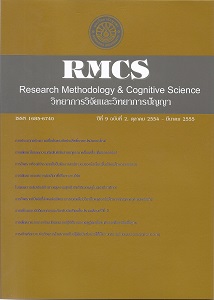การพัฒนาโมเดลความสัมพันธ์เชิงสาเหตุของการดื่มเครื่องดื่ม แอลกอฮอล์ของบุคลากรทางการศึกษา จังหวัดจันทบุรี
Main Article Content
Abstract
การวิจัยนี้มีวัตถุประสงค์เพื่อพัฒนาและตรวจสอบโมเดลความสัมพันธ์เชิงสาเหตุของการดื่มเครื่องดื่มแอลกอฮอล์ของบุคลากร ทางการศึกษา จังหวัดจันทบุรีกลุ่มตัวอย่างเป็นบุคลากรทางการศึกษา จังหวัดจันทบุรี ประจําปีการศึกษา 2554 จํานวน 400 คน โดยสุ่ม ตัวอย่างแบบแบ่งชั้นภูมิเครื่องมือที่ใช้ในการวิจัยประกอบด้วย แบบสอบถามความวิตกกังวลทางสังคม ความคาดหวังเชิงบวกจากการดื่ม เครื่องดื่มแอลกอฮอล์พฤตกรรมการดื่มเครื่องดื่มแอลกอฮอล์และผลจากการดื่มเครื่องดื่มแอลกอฮอล์การวิเคราะห์ ข้อมูลใช้ โปรแกรม SPSS วิเคราะห์ค่าสถิติพื้นฐาน และใช้โปรแกรม LISREL 8.54 วิเคราะห์โมเดลความสัมพันธ์เชิงสาเหตุ
ผลการวิจัยปรากฏว่า โมเดลความสัมพันธ์เชิงสาเหตุของการดื่มเครื่องดื่มแอลกอฮอล์ ของบุคลากรทางการศึกษา จังหวัดจันทบุรี ประกอบด้วยตัวแปรแฝง 4 ตัวแปร ได้แก่ความวิตกกังวลทางสังคม ความคาดหวังเชิงบวกจากการดื่มเครื่องดื่มแอลกอฮอล์ พฤติกรรม การดื่มเครื่องดื่มแอลกอฮอล์ และผลจากการดื่มเครื่องดื่มแอลกอฮอล์สอดคล้องกับข้อมูลเชิงประจักษ์อยู่ในเกณฑ์ดีโดยพิจารณาจากผลการ ตรวจสอบค่าไค-สแควร์มีค่าเท่ากับ 14.74 ค่า df เท่ากับ 40 ค่า p เท่ากับ 1.00 GFI เท่ากับ 1.00 AGFI เท่ากับ 0.98 CFI เท่ากับ 1.00 และ RMSEA เท่ากับ 0.00 ตัวแปรทั้งหมดในโมเดลสามารถอธิบายความแปรปรวนของผลจากการดื่มเครื่องดื่มแอลกอฮอล์ได้ร้อยละ 27 ตัวแปรพฤติกรรมการดื่มเครื่องดื่มแอลกอฮอล์มีอิทธิพลทางตรงต่อผลจากการดื่มเครื่องดื่มแอลกอฮอล์และความวิตกกังวลทางสังคมมีอิทธิพล ทางอ้อมต่อผลจากการดื่มเครื่องดื่มแอลกอฮอล์โดยส่งผ่านความคาดหวังเชิงบวกจากการดื่มเครื่องดื่มแอลกอฮอล์และพฤติกรรมการดื่ม เครื่องดื่มแอลกอฮอล์
A Causal Relationship Model of Alcoholic Drinking among Education Personnel in Chanthaburi Province
Pradith Thongkamwun
Khlung Ratchadapisake School, Chanthaburi, Thailand
The purpose of this research was to develop and validate a causal relationship model of alcoholic drinking of education personnel in Chanthaburi province. The model consisted of four latent variables: social anxiety, alcoholic drinking behavior, positive alcoholic outcome expectancy, and result of alcoholic drinking. The sample derived by means of stratifi ed sampling, consisted of 400 of education personnel Chanthaburi province in the academic year 2011. Research instruments included a social anxiety questionnaire, positive alcoholic outcome expectancy questionnaire, alcoholic drinking behavior questionnaire, and result of alcoholic drinking questionnaire. Descriptive statistics were generated using SPSS; causal modeling involved in the use of LISREL 8.54. Results indicated that the hypothetical model was consistent with the empirical data. Goodness of fi t statistics were: chi-square test = 14.74, df = 40, p = 1.00, GFI = 1.00, AGFI = 0.98, CFI = 1.00, RMR = 0.02, and RMSEA = 0.00. The variables in the hypothetical model accounted for 27 percent of the total variance of result of alcoholic drinking. Variable having a statistically significant direct effect on result of alcoholic drinking was alcoholic drinking behavior. The variable with statistically significant indirect effect on result of alcoholic drinking affecting through alcoholic drinking behavior, and positive alcoholic outcome expectancy, was social anxiety.

